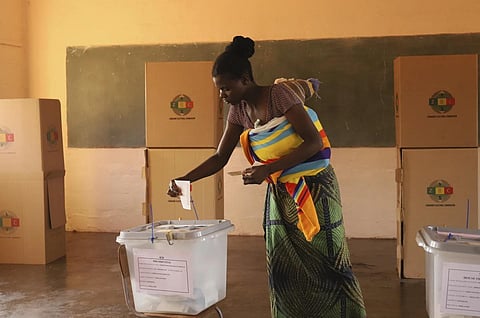

HARARE, Zimbabwe: Delays of up to 10 hours in mostly opposition strongholds marked voting in Zimbabwe on Wednesday as President Emmerson Mnangagwa seeks a second and final term in a country with a history of violent and disputed elections.
Long lines continued after sunset at some polling stations following the late distribution of ballot papers. The electoral commission said voting would continue until everyone who was waiting in line at 7 pm, when polls were scheduled to close, got a chance to vote.
“I am not going anywhere. I waited five years to vote, and these hours won’t kill me,” said Cathrine Nyakudanga, who carried her six-month-old baby on her back. She arrived before polls opened at 7 a.m. but ballot papers arrived only after 4 p.m.
“It pained me to see the elderly and women spending such long hours without food or water. That’s not safe,” said Stanley Gwanzura, a popular local gospel singer. Others waiting in line lit fires to grill meat for dinner.
This is the second general election since the ouster of longtime ruler Robert Mugabe in a coup in 2017.
Twelve presidential candidates are on the ballot, but the main contest is expected to be between 80-year-old Mnangagwa, known as “the crocodile,” and 45-year-old opposition leader Nelson Chamisa. Mnangagwa narrowly beat Chamisa in a disputed election in 2018.
Chamisa hopes to break the ruling ZANU-PF party’s 43-year hold on power. Zimbabwe has had only two leaders since gaining independence from white minority rule in 1980.
A runoff election will be held Oct. 2 if no candidate wins a clear majority in the first round. The election also determines the makeup of the 350-seat parliament and nearly 2,000 local council positions.
“It’s becoming tougher to survive in this country,” said Basil Chendambuya, an early voter in a working-class township in Harare. “I am hoping for change. This is my third time to vote and I am praying hard that this time my vote counts.”
He said his two adult children are working menial jobs and surviving “hand to mouth.”
The southern African nation of 15 million people has vast mineral resources, including Africa’s largest reserves of lithium, a key component in making electric car batteries. But watchdogs have long alleged that widespread corruption and mismanagement have gutted much of the country’s potential.
European Union chief election observer Fabio Massimo Castaldo told reporters that around 30% of polling stations in Harare had significant delays in opening, often linked to the lack of essential materials, “notably, in many cases, paper ballots.”
The Zimbabwe Elections Support Network, a non-governmental organization, said the delays were “disproportionately concentrated” in urban areas, which are opposition strongholds.
“This is very strange,” Nevers Mumba, head of the regional Southern Africa Development Community observer mission, told reporters.
The Zimbabwe Electoral Commission acknowledged the late distribution of ballot papers at some polling stations and blamed it on printing delays “arising from numerous court challenges.” Governing party activists and the opposition had brought a flurry of cases over who could run in both presidential and parliamentary elections.
Chamisa alleged intimidation in rural areas but said his supporters should be patient. “We are winning this election,” he said. “They know it and that’s why they are panicking.”
Ahead of the election, opposition and rights groups including Human Rights Watch and Amnesty International accused Mnangagwa of seeking to silence dissent amid rising tensions due to a currency crisis, a sharp hike in food prices, a weakening public health system and a lack of formal jobs.
After voting, Mnangagwa expressed confidence he would win. “If I think I am not going to take it, then I will be foolish,” he said. He encouraged people to be peaceful.
Mnangagwa was a close ally of Mugabe and served as vice president before a fallout ahead of the 2017 coup. He has sought to portray himself as a reformer, but many accuse him of being even more repressive.
Zimbabwe has been under United States and EU sanctions for the past two decades over allegations of human rights abuses, charges denied by the governing party. Mnangagwa has repeated much of Mugabe’s rhetoric against the West, accusing it of seeking to topple his regime.
The Carter Center, invited by the government to observe the polls, said 30 members of its 48-member observer team had not been accredited on the eve of the elections.
Several local human rights activists, including lawyers and a clergyman viewed as critical of the government, also were denied accreditation to observe the vote. The US State Department condemned Zimbabwe’s decision to deny accreditation to them and to several foreign journalists.